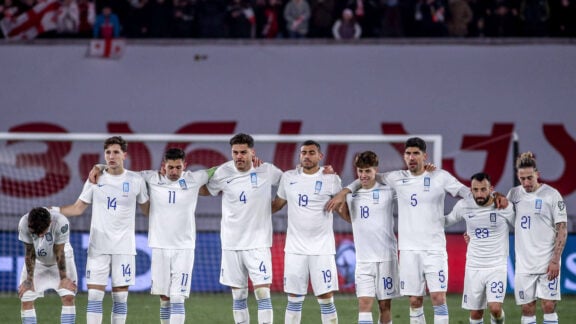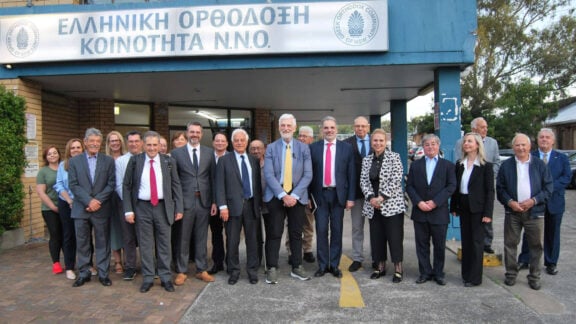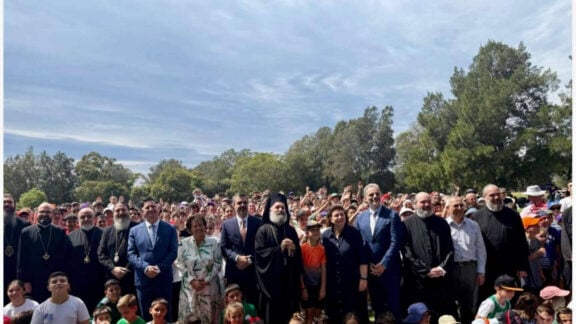Πάσχα, as we call it, has always held a special place in my heart. A time of year characterised by family and faith, Holy Week has involved symbolic traditions for as long as I can remember. Churches are filled with familiar faces as children dart amongst the crowds and elders watch on proudly, their faces illuminated by the Holy Light. Red eggs are dyed, godparents meet with their godchildren to gift λαμπάδες and women gather with youth to decorate the Επιτάφιο on the morning of Good Friday. Memories of standing under Melbourne’s tree-lined streets at midnight, where as a community we sing the words to ‘Χριστός Ανέστη’, remind me of an unconditional joy that words can’t define nor capture.
This year is different in many respects. Church doors are closed, faithful worshippers cannot access Holy Communion and grandchildren are separated from their grandparents. Despite our physical separation at this uncertain time, the grace of Easter reminds us that our fortress and the one thing that remains constant in our lives, is the love of God and our Saviour Jesus Christ.
Easter this week provides a valuable and unique opportunity to reflect; to remember Christ’s passion story by looking through his lens and that of the disciples in the Gospel. What is distinctive about this year however is that as we look through this lens, our vision is less blurred by the detached indifference that we have become accustomed to. Is it possible that during these turbulent times, a gentle spirit inside us will whisper in our hearts that we can do better, that we can empathise with our fellow man, that we can recognise sacrifice and suffering?
Could it be possible that by enduring the veritable tsunami of COVID-19, we can redefine a new ‘normal’ through an understanding of our shared humanity?
While navigating our way through life, we need to re-examine our ‘purpose’ which can at times seem nebulous. Quietly spoken words of what is right turn into white noise when we are deafened by the jaded sound of self-preservation. Unfortunately there are many instances where we are encouraged, either implicitly or explicitly, to covet what we do not have in the never-ending and fruitless pursuit of keeping up with others. Sentiments of inadequacy are exacerbated within the sphere of technology, where pretty pictures and glossy facades on Facebook and Instagram are all too believable. Consequently, we are convinced that our happiness is rooted in worldly ‘things’. By extension, we are led to believe that if we don’t doggedly cling to these things, we will singlehandedly jeopardise our happiness and lead lives of mediocrity at best.
In our community, we have the power to challenge these ideals and acknowledge the abundant grace of God and His word that “those to whom much is given, much will be required” (Luke 12:48). We need to recognise that we have all been granted gifts of the Holy Spirit with which we have a responsibility as doers rather than hearers.
READ MORE: No church; No problem; Saint yourself a seat

The beauty of these gifts has glistened within the Greek community in recent weeks; from the #SaintYourselfaSeat initiative by the youth committee of St Anthony’s Greek Orthodox Church Prospect in Adelaide, to the voluntary contributions of the Merimna of Pontial Ladies in distributing endless trays of koulourakia to struggling community members. Whether we have been granted the gift of encouragement, teaching, or other talents, we are expected to serve others in the image of Jesus Christ and reveal God’s love to a hurting and fallen world.
Even in the darkness of COVID-19, the brightest light has shone in the form of an incredible generosity of spirit; at the crux of which is the desire to care and to build others up. The home of the Anzac spirit and a country that proudly celebrates diversity from “all the lands on earth” has sung with one voice to reach for a common dream that is predicated on what truly matters. On both a state and federal level, our leaders have personified courage and commitment; from the resolute determination to protect the vulnerable, to the recent mercy missions bringing Aussies home. Shared social responsibility has emerged through our heroic health workers, emergency services, grocers, bakers, farmers, teachers, truck drivers, charitable organisations preparing meals and even teenagers who prioritise reaching out to friends who shouldn’t feel alone. We have exemplified the true meaning of agape which is the highest and purest form of love; it champions the importance of giving rather than taking, of self-sacrifice rather than self-benefit.
READ MORE: Coronavirus is changing the way we live, pray, enjoy Easter and our spirituality too
The whole world wakes up each day, waiting with bated breath and an unrelenting eagerness for things to get back to ‘normal’. Not a single soul on this planet knows when this will all be over. To say that the implications on the other side of COVID-19 will be far-reaching is not only an understatement, but an oversimplification. Haunting images of empty streets, of a global human family in mourning, will remain etched in our minds for years to come. Yet this week, as we pray and watch live broadcasts that are available to us, let us remember that in moments of desperate faith and dependence, Jesus is most magnified. This Πάσχα, let us fix our eyes on Christ to see that as painful a time as this is, there is hope in the resurrection of our Saviour.
“The Word gave life to everything that was created, and his life brought light to everyone. The light shines in the darkness, and the darkness can never extinguish it” (John 1:4-5).
The Holy Light may not be passed between each parishioner this Easter.
We can however let the Holy Spirit light our souls as we seek comfort in God’s divine majesty.
Καλή Ανάσταση.
Stephanie Stamatelatos is an Arts/Law student at Monash University










